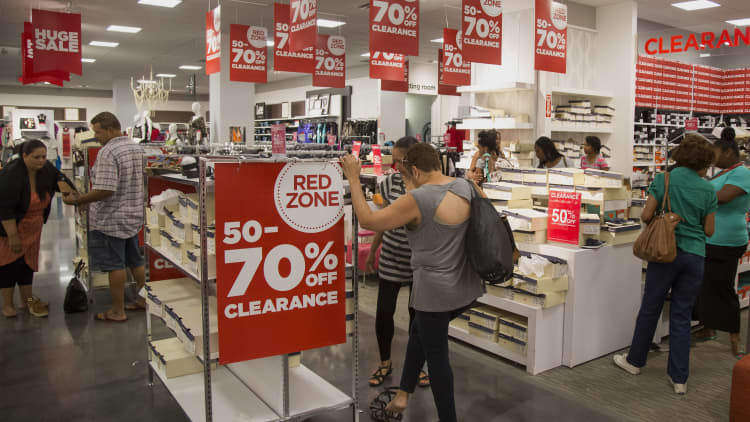
A border adjustment tax, as currently proposed in the House bill, would not kill J.C. Penney's business, but it would make it really difficult for the department store to be profitable, CEO Marvin Ellison told CNBC in an exclusive interview.
Ellison was among the retail executives that meet with President Donald Trump and lawmakers in Washington, D.C., to discuss tax reform last month.
When asked if it was possible to operate in the black if the proposal goes into effect as written, Ellison said simply, "It will be very difficult. In the short run, virtually impossible."
J.C. Penney has run its financial models and Ellison said its tax rate swells exponentially.
"It takes our tax structure, as an example, from roughly a 34 percent corporate tax to over 170 percent," he explained. "So that gives you an idea of the financial impact to a company like J.C. Penney. And that's very consistent with other companies, companies like Best Buy, Target, Kroger, Wal-Mart — I mean, you name it, we're all in this same precarious position because we don't have a manufacturing capacity that exists in the United States."
It all means an increase in the prices consumers pay is inevitable.
"Very simply, it adds a 20 percent cost to goods that are going to middle- and low-income consumers. There's no way around it, there's just the simple math," Ellison said.
Still, the conversations are continuing and a border adjustment tax isn't a foregone conclusion.
"It's a very tricky situation, but if it goes through as written, it's going to be pretty devastating to the U.S. consumer in many ways."
Ellison said J.C. Penney is in a better position than some of its competitors because it has a higher percentage of private apparel brands in its merchandise assortment. Private brands, like J.C. Penney's St. John's Bay and Liz Claiborne, are brands owned by a particular retailer, those that can only be purchased at the retailer and are more profitable than national brands available at multiple retailers.
"But if I can control the first cost and maybe there's something we can do to adjust the pricing structure to try to alleviate some of the cost without taking it to the consumer. So we think it gives us a complex problem to solve but I don't think it's a death blow to J.C. Penney," he said.
However, there's a limit to how much cost J.C. Penney can strip out. J.C. Penney, like the vast majority of retailers, has to rely on an overseas supply chain.
"It would take me a decade just to get the level of manufacturing capacity where we need it to serve the needs of our consumers," he said, pointing to the American Apparel and Footwear Association data that shows 98 percent of clothing bought in the United States and 97 percent of the shoes, are imported.
"We'd have to renegotiate cost. We'd have to look at the factories and the suppliers we use in different locations. We'd have to look at design structure — we call it design to value. So there are a lot of things we'd have to do, but none of those things would benefit the consumer directly because we'd still have to raise prices. I can't take out 20 percent cost without cheapening the goods and we're not going to sell goods at that poor quality."


